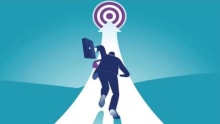Why HR leaders need to leverage consumer-grade tech
TransformTalent Read similar articles

The changing digital landscape has overhauled traditional HR practices, making it less process-driven, and more agile. The realization that talent management is an indispensable part of preparing for the future of work has, further, expedited this transformation, and has led to new workplace management trends and practices.
The conversation on providing a consumer-grade experience to employees has also gained momentum. In fact, ‘consumer-grade experience’ is often identified as one of the four anchors for making HR future-ready.
How is the ‘consumerization’ of employees expected to benefit the workplace? What can organizations do to design a consumer-grade experience for their employees? Let’s find out.
1. Improved loyalty and engagement
The use of consumer-grade tech in HR will not be limited to increasing connectivity or collaboration, but also personalize employee experiences . This redesigned workplace will not only be naturally more productive, innovative, and collaborative but also ensure greater employee happiness and engagement. Recognizing the fact that “one size doesn’t fit all,” cultivating customized experiences for employees and will help organizations devise relevant people policies by segregating the workforce into groups with specific needs and goals.
As a matter of fact, offering a personalized experience can help organizations manage talent shortages by attracting and retaining top talent. A Deloitte report states, “Like customers, better employee understanding can not only improve satisfaction and retention but also bolster innovation and performance. Turns out employee values are not so different from those of a consumer.”
2. Catering to a vastly different workforce
The changing digital landscape has put a premium on time and attention spans, workers are use to the convenience of using the technology they like whenever and wherever they want.. They expect technology, devices, and organizations to deliver accessible, usable, and intuitive solutions. Similarly, they also expect their work to be rewarding and their workplace to be open, transparent, and inclusive.
Thus, HR leaders need to design seamless tools that are not only focused on user experience but also resemble the technology we have become familiar with. As a Deloitte report rightly states, “Digital HR tools can enable employees to build their learning and development plans, initiate conversations with management remotely, and work when and in the ways that work best for them as individuals.”
3. Driving innovation and ownership
The goal of integrating intelligent technology with HR isn’t merely to save time or resources. The idea is to empower employees with self-service technology and streamline work processes for efficiency. This will require an rethinking existing systems that are approval-based and adoption of user-centric frameworks that maximize productivity. The focus of digital HR tools will be to cultivate a healthy culture for the workforce that allows them to harness their potential. Thus, one can expect better career mobility and access to learning tools,
Drawing comparisons between what the consumer and the employee A Deloitte report states that “the very attributes that technology has enabled today—simplicity, flexibility, convenience, personalization, and connection—have come to be what we expect, even demand, as consumers.” It further says that these values are forcing organizations to offer opportunities for growth, flexibility, and innovation to their employees.
As the future of work is fast becoming an everyday reality, it is clear that in order to ensure maximum engagement, organizations will have to ensure the employee experiences mirror consumer experiences. But how does one get started? Gartner recommends using the eight blocks of employee engagement management to achieve a consumer-grade employee experience, namely, vision, strategy, organizational collaboration, HR information and insight, employee experience, process, technology, and metrics. Much like the process itself, no one solution will work well for everyone and organizations need to cultivate their own unique cultures, practices, and work-processes by leveraging the best consumer-grade technology to design a workplace experience that genuinely empowers employees.





